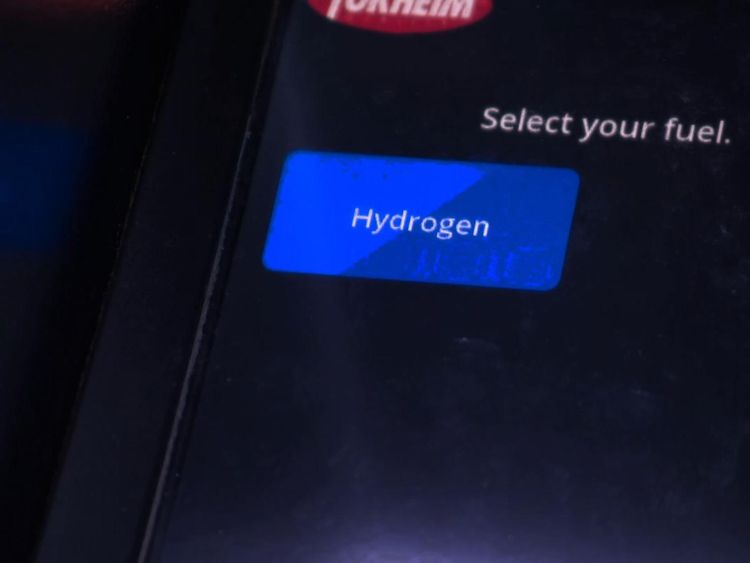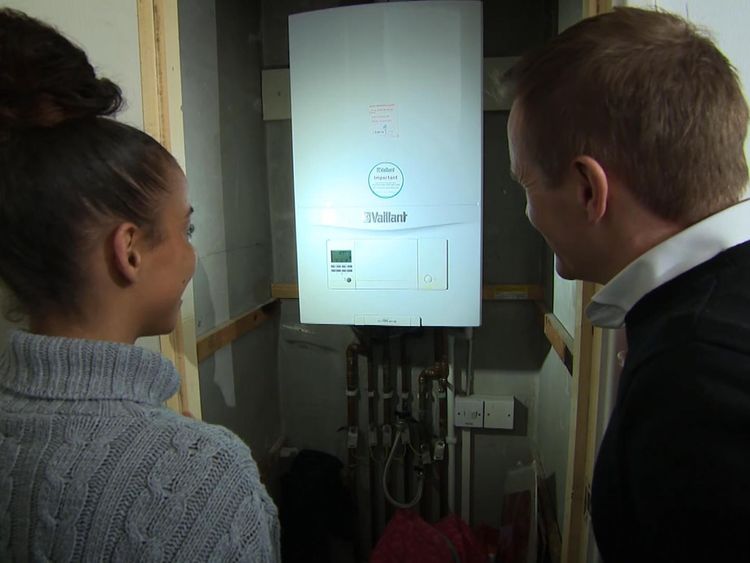Hydrogen-powered cars that emit just an occasional splash of water need to be a more common sight on the UK's roads if the government is to meet its climate change targets, an influential committee has concluded.
Less than 100 hydrogen-powered vehicles are currently on the roads in Britain. One of them is driven around Sheffield by Adam Swift who monitors air quality in the city.
"It's a bit like driving a dodgem in as much as it is just stop or go," he told Sky News. "And it also incredibly quiet to drive."
"Then every now and again it has a little wee from the side pipe. Occasionally you get the odd look from the public but nobody is that bothered."
The water drips are the only emission from the vehicle that refuels at a site on the edge of Sheffield run by ITM Power.
Unlike traditional fuel stations a wind turbine provides the power that runs into a small conversion station that uses water electrolysis to make hydrogen. Users can then buy the gas at the pump at a similar cost to petrol or diesel.
A full tank of hydrogen can provide a range of around 300 miles in Toyota's Mirai models – billed as the electric cars you don't need to plug in.
Despite the £60,000 price tag the car manufacturer is confident they can scale up production and usage in the coming years in a similar way their Prius model pioneered hybrid vehicles.
The UK's network of refuelling stops is slowly being built with hydrogen already available at Beaconsfield services on the M40 and Cobham on the M25.
Vans, lorries and buses have all been adapted in pilot projects and transport is just one of several hydrogen technologies that the Committee for Climate Change believes could be harnessed by the UK government.

Chairman of the Committee on Climate Change Lord Debden said: "Hydrogen has the potential to contribute to near-zero carbon energy emissions if used strategically.
"The government must now decide whether it wishes to develop a UK hydrogen option, taking decisions now that will see the first deployment in the 2020s.
"This must be in parallel with efforts to improve energy efficiency, build further low-cost renewables and get carbon capture and storage underway. The time for the government to move from theory to practice has arrived."
The most ambitious project is a proposal to gradually turn the existing gas network across the north of England into a hydrogen delivery system to almost four million boilers in homes from Newcastle to Liverpool.
A group of gas firms and experts are working on the pioneering scheme that developers claim would be the biggest decarbonisation project in the world.
Head of Hydrogen Technologies at Northern Gas Networks, Dan Sadler, told Sky News: "The ambition with this is massive and it should be massive.
"The north of England, due to our geology and existing networks, makes it the logical place to start this."
"If rolled out UK wide, this detailed engineering solution has the potential to decarbonise 70% of domestic heat by 2050, and represents a huge leap towards our country meeting the climate change challenge."
Boilers would need to either be upgraded or replaced which would be funded by an extra £50 being added to the energy bill of every UK home to help deliver the £23bn scheme.

Law student Chloe Edwards-Simpson who lives in Leeds told Sky News she didn't really mind how her boiler was powered as long as it was reliable and reasonably priced.
She said: "I do care about the environment so anything damaging I wouldn't really want – and at the same time my daughter's health and chest are more important to me so I am more bothered about it working than how it works.
"Perhaps it'll be a good thing if they do change them all – I don't think I'd mind paying a bit extra if it cuts the emissions."
More from Science & Tech
The committee called on the government to commit to developing a low-carbon heat strategy within the next three years, but warned that hydrogen technologies are not a "silver bullet" solution.
They say that producing hydrogen from renewable sources in expensive and that making hydrogen from fossil fuels, even when carbon capture technologies are deployed, is not a zero carbon process.
[contf] [contfnew] 
Sky News
[contfnewc] [contfnewc]







